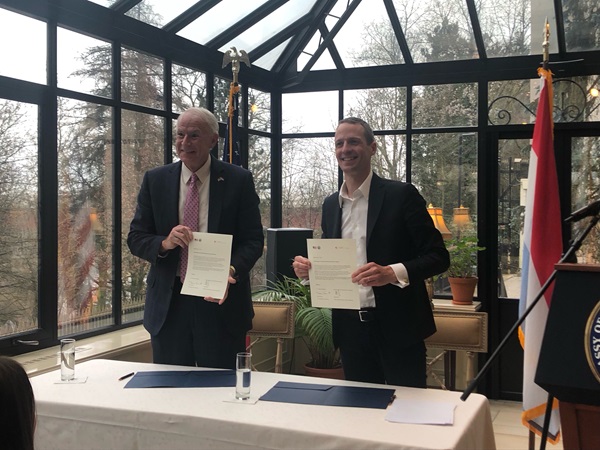 US Ambassador to Luxembourg, Tom Barrett and Serge Wilmes, Luxembourg's Minister for the Environment and Biodiversity;
Credit: Otilia Dragan/Chronicle.lu
US Ambassador to Luxembourg, Tom Barrett and Serge Wilmes, Luxembourg's Minister for the Environment and Biodiversity;
Credit: Otilia Dragan/Chronicle.lu
On Wednesday 21 February 2024, the US Ambassador to Luxembourg, Tom Barrett and Serge Wilmes, Luxembourg's Minister for the Environment and Biodiversity, signed the Global Net-Zero Government Initiative agreement at the US Embassy in Luxembourg.
After the 2022 United Nations Climate Change Conference (COP27), where the US proposed the Global Net-Zero Government Initiative, urging nations to aim for net-zero emissions from their national government activities by 2050, Luxembourg has pledged to join this effort.
Through its participation in this initiative, Luxembourg thus affirmed its commitment to achieving net-zero emissions from its national government operations by no later than 2050, thereby emphasising the critical role governments can play in addressing climate change.
The Ambassador noted that he called Minister Wilmes, asking to arrange a meeting to discuss organising a signing ceremony and working together towards a “greener, safer, more prosperous world” goal, and that it took „maybe half a second" for the minister to agree to do this. „We have to do this together," the Ambassador stressed, emphasising the shared commitment, especially for national governments, which play a pivotal role in fighting climate change, as some of the largest employers and consumers worldwide. He added that the governments of Luxembourg and the US should lead by example. Ambassador Barrett recalled how President Joe Biden signed the instrument to bring the United States back into the Paris Agreement hours after taking office. Finally, he stressed the urgency of the matter and the “commitment to safeguarding the future of the planet”. The Ambassador also urged the students present to “take an active role in combating climate change” emphasising his belief that “we can turn the tide on climate change” by working together.
Minister Wilmes voiced his pride that the Luxembourg government will, as far as possible, equip all public buildings with photovoltaic panels by 2030. He added that 3% of public buildings have been renovated per year since 2021, with all new buildings now being heated by heat pumps. Minister Wilmes noted that, following the COP28 UN Climate Change Conference in Dubai, despite difficult negotiations with fossil fuel producing countries, it became clear that humanity is facing a "global challenge". He emphasised that it will take “ambitious countries working together and pushing other countries” in order to move forward.
The signing ceremony was held in the presence of students from Luxembourg schools, including St George's School, the International School of Luxembourg and Lycée Robert-Schuman. After the signing ceremony, several student representatives from the schools presented their ideas on climate change initiatives in the ongoing battle against the climate crisis to Ambassador Barrett and Minister Wilmes.
The students from St George's school, part of the institution’s so-called “eco agents” were dressed in bright green hoodies bearing the inscription “there is no planet B”. They took turns noting ideas and initiatives that they have been taking as part of school projects: “The first part of change is awareness,” one student said, while others noted that they have reduced emissions by 16% since 2021 and that they are working together on multiple initiatives and programmes to reduce consumptions, use more sustainable supplies and do upcycling workshops in addition to making birdfeeders, planting trees and other activities with a focus on climate action.
The students from Lycée Robert-Schuman emphasised that “we stand at a turning point in history,” with an “emergency ahead of us”. They also stressed the need to battle lobbyism for the future, and for a more sustainable life.
Finally, the ISL students highlighted the need to protect, preserve, and increase nature, adding that innovation will come from their generation, one “willing to change and combine different perspectives”. They discussed the adoption of a tool to monitor track and evaluate progress in sustainability initiatives at their schools. They also warned of the potentially negative implications of policies and stressed the need to “look carefully at their socio-economical impact” to avoid increasing the poverty gap and to maximise the chances to reach their goal.








